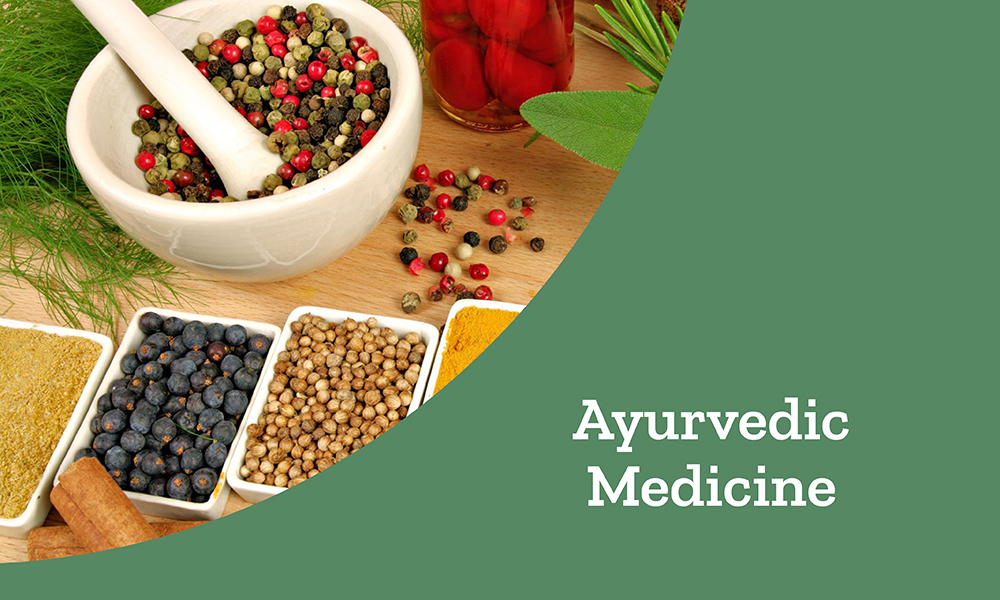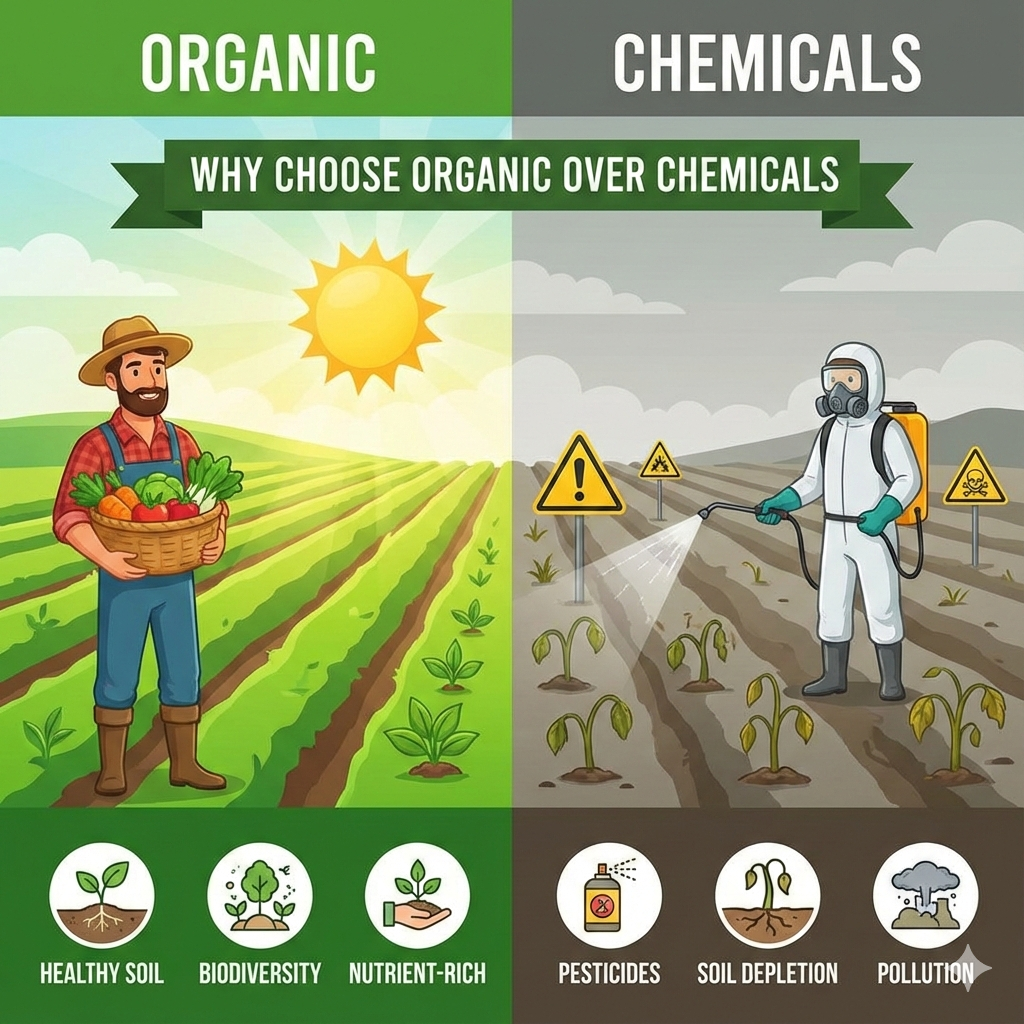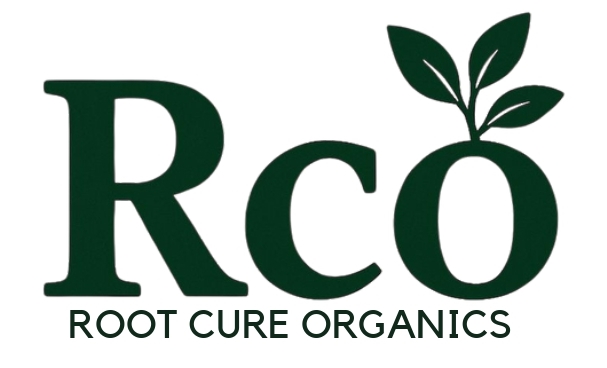- Women Care

Ayurveda is an ancient system of medicine that originated in India more than 5,000 years ago. The word "Ayurveda" comes from the Sanskrit words "Ayur" (life) and "Veda" (science or knowledge) — so it literally means "the science of life."
- Special Products

Ayurveda is an ancient system of medicine that originated in India more than 5,000 years ago. The word "Ayurveda" comes from the Sanskrit words "Ayur" (life) and "Veda" (science or knowledge) — so it literally means "the science of life."
- Featured Products

Ayurveda is an ancient system of medicine that originated in India more than 5,000 years ago. The word "Ayurveda" comes from the Sanskrit words "Ayur" (life) and "Veda" (science or knowledge) — so it literally means "the science of life."
Why Choose Organic Over Chemicals

Introduction
In today’s world, people are becoming increasingly aware of what they consume and how it impacts both their health and the environment. The debate between organic vs. chemical-based products has been ongoing for years. While chemicals promise faster results, higher yields, or longer shelf life, the long-term consequences often outweigh these short-term benefits. On the other hand, organic choices focus on natural growth, sustainability, and overall wellness.
This blog explores why choosing organic over chemicals is not just a trend but a conscious lifestyle decision that promotes better health, supports the environment, and ensures sustainability for future generations.
What Does “Organic” Really Mean?
The word organic refers to products that are grown, processed, and manufactured without synthetic chemicals, pesticides, artificial fertilizers, genetically modified organisms (GMOs), or harmful preservatives.
Organic products—whether food, skincare, or household items—are made with natural inputs and eco-friendly practices. This ensures purity, safety, and authenticity.
Key Features of Organic Products:
- Grown without synthetic pesticides and fertilizers.
- Free from chemical preservatives and artificial colors/flavors.
- Non-GMO (not genetically modified).
- Environmentally friendly farming and production practices.
- Certified by recognized organic standards.
The Dangers of Chemical-Based Products
Chemical-based farming and product manufacturing often prioritize quantity over quality. While they may appear appealing due to low costs and faster availability, they carry hidden risks.
Health Risks of Chemicals:
- Pesticide Residue in Food – Regular exposure can cause long-term health problems such as hormonal imbalance, fertility issues, and even cancer.
- Toxins in Skincare – Chemicals in cosmetics can lead to skin irritation, allergies, and premature aging.
- Contaminated Water & Soil – Excessive use of synthetic fertilizers and pesticides contaminates groundwater and reduces soil fertility.
- Antibiotic Resistance – Chemical-fed livestock often leads to antibiotic-resistant bacteria, which is a growing concern worldwide.
Environmental Damage:
- Soil degradation and loss of natural fertility.
- Air and water pollution due to chemical runoff.
- Destruction of beneficial microorganisms in the soil.
- Long-term climate impacts due to unsustainable practices.
Why Choose Organic Over Chemicals?
1. Better for Your Health
Organic foods are rich in nutrients because they are grown naturally without harmful residues. Studies suggest that organic produce often contains higher levels of antioxidants, vitamins, and minerals compared to conventionally grown products.
- No synthetic pesticide residues.
- Naturally ripened crops with better taste.
- Reduced chances of allergies and food intolerances.
2. Safe for Children and Families
Children are more vulnerable to chemical exposure because of their developing immune systems. Choosing organic ensures that the food, skincare, and household items your family uses are safe and toxin-free.
3. Protects the Environment
Organic farming nurtures the ecosystem. By avoiding chemicals, farmers maintain soil fertility, protect biodiversity, and reduce water pollution.
- Uses crop rotation and natural composting.
- Promotes healthy soil microorganisms.
- Conserves water and reduces greenhouse gas emissions.
4. Supports Sustainable Farming
Organic agriculture empowers local farmers and promotes long-term sustainability. It reduces dependency on expensive chemical inputs, encourages self-sufficiency, and ensures the land remains fertile for future generations.
5. Better Taste & Quality
Organic produce is often fresher and more flavorful since it is grown in nutrient-rich soil and harvested without artificial ripening agents. Consumers often report that organic fruits and vegetables taste more natural and wholesome.
6. Ethical & Animal-Friendly
Organic livestock is raised without growth hormones, antibiotics, or synthetic additives. Animals are given access to natural feed, open space, and better living conditions—making the products more ethical and humane.
Organic in Everyday Life
Going organic isn’t limited to food. Today, organic products are available in multiple categories:
- Organic Fruits & Vegetables – Grown naturally without chemicals.
- Organic Grains & Pulses – Free from preservatives and polishing agents.
- Organic Oils & Spices – Pure, chemical-free, and full of natural aroma.
- Organic Skincare & Cosmetics – Free from parabens, sulfates, and harmful chemicals.
- Organic Herbal Supplements – Natural wellness solutions without side effects.
By switching to organic in different areas of life, you not only protect your health but also encourage a healthier planet.
Myths About Organic Products
Myth 1: Organic Products Are Too Expensive
While organic products may cost more initially, they save money in the long run by reducing medical expenses caused by chemical exposure.
Myth 2: Organic Farming Cannot Feed the World
Studies show that organic farming can produce sufficient yields while maintaining soil health, making it sustainable for the future.
Myth 3: Organic Labeling Is Just Marketing
Authentic organic products are certified by authorities (such as USDA Organic, India Organic, or Ecocert), ensuring their authenticity.
How to Transition to Organic Living
Shifting to organic doesn’t have to be overwhelming. Start small and make gradual changes:
- Replace regular fruits and vegetables with organic options.
- Switch to organic staples like rice, wheat, and pulses.
- Try organic cold-pressed oils and spices.
- Choose organic skincare free from parabens and chemicals.
- Support local organic farmers and brands.
Conclusion
The choice between organic and chemical-based products goes beyond personal preference—it is about protecting your health, preserving the environment, and building a sustainable future. By choosing organic over chemicals, you are investing in purity, wellness, and ethical living.
RootCure Organics believes in delivering products that are 100% natural, safe, and sustainable, helping you make healthier choices for yourself and your loved ones.
Go organic, live healthy, and let nature be your cure.
